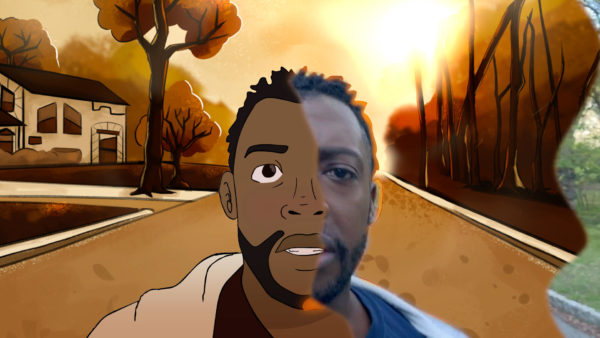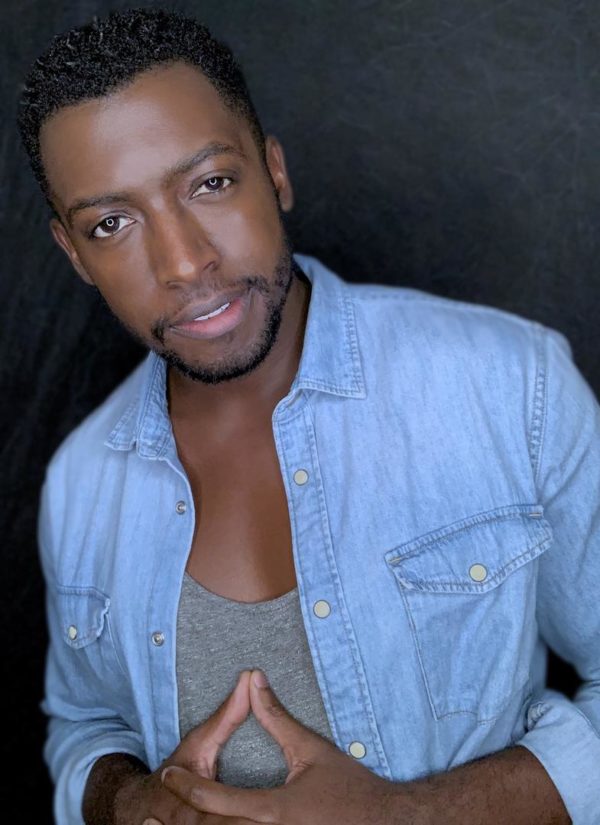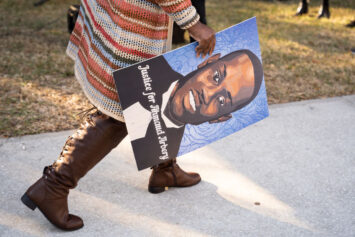A new film that recently debuted on Netflix offers some explosive artistic commentary on police brutality.
“Cops and Robbers” premiered on the streaming platform Dec. 28. It is the animated adaptation of a poem Black activist Timothy Ware-Hill penned in the wake of Ahmaud Arbery’s death. Jada Pinkett Smith is one of the executive producers.
“Art, poetry, writing, filmmaking have always been the ways I express myself,” Ware-Hill told Atlanta Black Star. “So when Ahmaud Arbery happened, I was angry, I was distraught, but I wasn’t surprised. Because we’ve seen it before, it’s just in a different context. But it’s the same story.”

Arbery, 25, was fatally shot three times as he and Travis McMichael struggled over a shotgun Feb. 23. McMichael and his father Gregory stalked Arbery in a pickup truck when they spotted him jogging through their Brunswick, Georgia, neighborhood. The father-son duo told authorities he fit the description of a suspected burglar and claimed they were trying to make a citizen’s arrest.
William “Roddie” Bryan, one of the McMichaels’ neighbors, trailed Arbery in a second vehicle and recorded the shooting on his cell phone.
No charges were filed in the case until the heartwrenching video was leaked to the media on May 5. It quickly went viral.
The father and son were arrested May 7 and Bryan was taken into custody 14 days later. All three white men now face felony murder charges and are being held without bond as they await trial.
Ware-Hill is a former Broadway stage thespian turned screen actor and screenplay writer. He performed an emotional recital of his poem that he recorded while jogging down the street in his own neighborhood.

He posted a video of his performance on Facebook and Instagram on May 7. It was shared by the thousands on social media.
That’s where indie filmmaker Arnon Manor, a CG animator and visual effects artist, entered the fray. Like Ware-Hill, he too was outraged by the graphic footage of Arbery’s killing. A native of Israel who grew up in England, Manor said he experienced anti-Semitism and is very sensitive to ethnic violence. He wanted to do something, but said he felt helpless.
He watched Ware-Hill’s video and found it compelling. Manor came up with the idea of animating the recital and adding visuals to bring Ware-Hill’s words to life.
“It was so powerful and full of emotion and I just immediately wanted to do something in a way that I know how, which is to create content, specifically with animation and visual effects,” said Manor. “His performance and his words had such a strong…they hit me…it was like a rollercoaster ride. It was just incredible in how he performed and delivered it.
Manor reached out to Ware-Hill through social media and pitched his idea. Ware-Hill was intrigued and the two quickly began working together on co-directing the adaptation.
To pull off their vision, Ware-Hill and Manor enlisted animators and VFX artists from around the world to artistically interpret each line of the poem. The crews began animating at the end of May, just as video surfaced of the death of George Floyd, who died after a Minneapolis police officer knelt on his neck for nearly nine minutes. Ware-Hill and Manor created in a climate of unrest, the hotbed of racial reckoning and global protests that resulted from Floyd and Breonna Taylor’s killings.
The directors said the visuals poignantly depict the frighteningly unpredictable “reality of being Black in America. At any moment, a joyous day can just turn on a dime from a simple act.” Ware-Hill explained. “When a police car pulls up behind us, all of our hearts — our pulse changes. We breathe differently when we see a cop car behind, whether they turn their lights on or not.”
“Cops and Robbers” is one of three animated shorts that debuted on Netflix late last year highlighting diversity in filmmaking with powerful stories.
Ware-Hill, in his poem, juxtaposed popular playground pastimes like Red Light, Green Light with the terror of excessive force and deadly police shootings. Accordingly, childlike innocence is interrupted by tragic law enforcement encounters throughout the seven-minute film.
Imagery of kids happily frolicking is contrasted against the jarring backdrop of armed officers roving the streets with larceny in their souls. A game of hop scotch is invaded by an officer pointing the barrel of his gun in a child’s face. A frantic mother runs through a throng of demonstrators only to find her son dead in a morgue.
Soon the imagery hearkens to the nation’s sordid racial past: Shackled and hogtied men; a noosed woman hanging from a street pole; Ku Klux Klansmen draped in robes and hoods; police officers in riot gear with protest signs swirling around them.
Cell phones are shown as black lights emitting ultraviolet waves to cast light on the nation’s proverbial stains of police brutality. The names of those who’ve been victimized by that brutality fill the screen.
Midway through, Alabama Shakes lead vocalist Brittany Howard breaks in with a soulful rendition of the Negro spiritual “Soon I Will Be Done” (also “Soon-A Will Be Done”).
At the end of that visual onslaught, the gleeful ambiance of children playing rambles on in the background for more than three minutes as the credits roll.
“What me and Arnon thought was it allows you to sit in what you just saw,” Ware-Hill said. “We don’t want you to escape it; you can just sit in it. And while you’re sitting in your own thoughts, those children laughing and playing becomes the soundtrack to your own mind of what you just witnessed.”
Manor, who emigrated to the United States from England about 20 years ago, realizes he has an outside perspective on race relations. He acknowledged he didn’t have a full grasp of the racial divide in this country until emigrating from the United Kingdom. He said he strives to be an ally in the fight against oppression.
Manor recalled watching Spike Lee’s “Do the Right Thing” as a young man in England. He said the movie “shocked me to the core,” particularly the climactic scene when Radio Raheem’s character was choked to death by a police officer.
“I think that entertainment, in the same way that ‘Do The Right Thing’ did with me way back when, it showcased a particular instance and I still carry that with me every day in my life,” Manor said. “I think the power of entertainment is something where we can push the limits of emotion more than, I think, even showing a video. Because we’ve all unfortunately seen these video recordings online of what happens. So what we’ve done is another interpretation where we’ve given the viewers something more than just the news feed. It’s a visual interpretation that hopefully gets them to emote in a different way.”
Ware-Hill shared an early version of “Cops and Robbers” with Academy Award-winning producer Lawrence Bender, who worked on the film. Bender shared the copy with friends and “it went through this webbed pipeline of different people in this industry,” Ware-Hill said.
Pinkett Smith was one of those people who saw the rough cut.
“She fell in love with it, was moved by it and said she wanted and had to be a part of it,” Ware-Hill said. “And it’s great to have her on board; because of who she is and her profile, she was able to amplify our piece in ways that Arnon and I by ourselves might not necessarily have been able to do.”
Somehow, the film also fell into the hands of Netflix executives. The streaming company offered to partner with Ware-Hill and Manor and air “Cops and Robbers” across the globe.
“We immediately thought Netflix, just with the bandwidth, because it’ll be out in 190 countries,” Manor said. “I’m waiting to see Timothy in Japanese…We couldn’t have asked for more. I mean, it’s the biggest stage in the world.”

